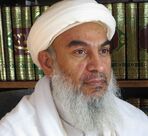Education from the Qurʾānic WorldviewEducation: The word education, first used around 1580s, originally from the Latin educatus (pp. of educare), meaning “bring up, rear, educate,” which is related to educere (meaning “bring out, lead forth”), is used in this text to refer to a process of life-long learning in both formal institutions as well as through informal means.
|
Muzaffar Iqbal
|
|
© Center for Islamic Sciences. All Rights Reserved.
Designed and Developed by Crescent Marketing Solutions |


